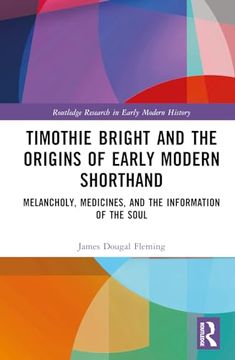Share
Timothie Bright and the Origins of Early Modern Shorthand: Melancholy, Medicines, and the Information of the Soul (Routledge Research in Early Modern History) (in English)
Fleming James Dougal (Author)
·
Routledge
· Hardcover
Timothie Bright and the Origins of Early Modern Shorthand: Melancholy, Medicines, and the Information of the Soul (Routledge Research in Early Modern History) (in English) - Fleming James Dougal
$ 161.05
$ 170.00
You save: $ 8.95
Choose the list to add your product or create one New List
✓ Product added successfully to the Wishlist.
Go to My WishlistsIt will be shipped from our warehouse between
Thursday, August 01 and
Friday, August 02.
You will receive it anywhere in United States between 1 and 3 business days after shipment.
Synopsis "Timothie Bright and the Origins of Early Modern Shorthand: Melancholy, Medicines, and the Information of the Soul (Routledge Research in Early Modern History) (in English)"
In Timothie Bright and the Origins of Early Modern Shorthand, J.D. Fleming brings together two areas of sixteenth-century intellectual history. One is the period emergence of artificial systems for verbatim shorthand notation--a crucial episode in the history of information. The other is the ancient medical discourse of melancholy humour, or black bile. Timothie Bright (1550-1615), physician and priest, prompts the juxtaposition. For he was the author, not only of the period's original shorthand manual--Characterie (1588)--but also of the first book in English on the dark humour: The Treatise of Melancholy (1586).Bright's account of melancholy involves a cybernetic phenomenology of the human. Essentially, we are psyches (souls or minds). We are sealed off from our bodies, operating them as automata across an interface. Psychological presence, for Bright, is illusion and pathology. Engrossing performances or representations therefore bring great danger, and so does the doctrine of predestination--less for its content than its typical delivery. Painful preaching was indispensable in sixteenth-century English Protestantism. But it falls foul of Bright's proscriptions. This is followed by his publication of the first known system for verbatim shorthand notation since antiquity, its technique heavily inflected toward a vocabulary of the pulpit. The passionate, oral performance of the inspired preacher receives an unprecedented textual preservative--and prophylactic. Bright's technology of information serves his phenomenology of alienation.This book will be of interest to students and scholars of the early modern period, the tradition of melancholy, and the history of information--as theory, and technology.

